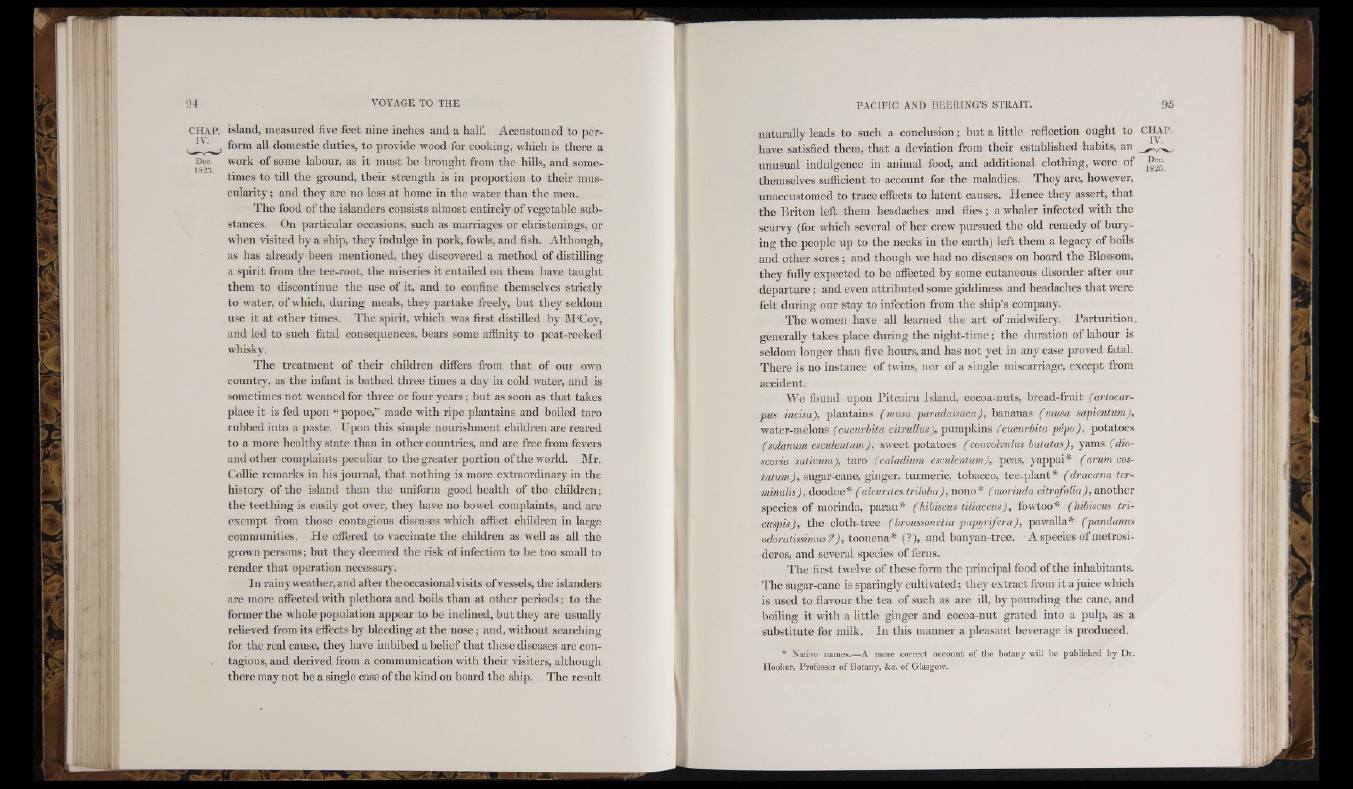
CH AR island, measnred five feet nine inches and a half Accnstomcd to perform
all domestic duties, to provide wood for cooking, which is there a
work of some labour, as it must be brought from the hills, and sometimes
to till the ground, their strength is in proportion to their muscularity
; and they are no less at home in the water than the men.
The food of the islanders consists almost entirely of vegetable substances.
On particular occasions, such as marriages or christenings, or
when visited by a ship, they indvdge in pork, fowls, and fish. Although,
as has already been mentioned, they discovered a method of distilling
a spirit from the tee-root, the miseries it entailed on them have taught
them to discontinue the use of it, and to confine themselves strictly
to water, of which, during meals, they partake freely, but they seldom
use it at other times. The spirit, which was first distilled by M‘Coy,
and led to such fatal consequences, bears some affinity to peat-reeked
whisky.
The treatment of their children differs from that of onr own
country, as the infant is bathed three times a day in cold water, and is
sometimes not weaned for three or four years ; but as soon as that takes
place it is fed upon “ popoe,” made with ripe plantains and boiled taro
rubbed into a paste. Upon this simple nourishment children are reared
to a more healthy state than in other countries, and are free from fevers
and other complaints peculiar to the greater portion of the world. Mr,
Collie remarks in his journal, that nothing is more extraordinary in the
history of the island than the uniform good health of the children ;
the teething is easily got over, they have no bowel complaints, and are
exempt from those contagious diseases which affect children in large
communities. He offered to vaccinate the children as well as all the
grown persons; but they deemed the risk of infection to be too small to
render that operation necessary.
In rainy weather, and after the occasional visits of vessels, the islanders
are more affected with plethora and boils than at other periods ; to the
former the whole population appear to be inclined, but they are usually
relieved from its effects by bleeding at the nose ; and, without searching
for the real cause, they have imbibed a belief that these diseases are contagious,
and derived from a communication with their visiters, although
there may not be a single case of the kind on board the ship. The result
naturally leads to such a conclusion; but a little reflection ought to CUtf
have satisfied them, that a deviation from their established habits, an
unusual indulgence in animal food, and additional clothing, were of
Dec.
1825,
themselves sufficient to account for the maladies. They are, however,
unaccustomed to trace effects to latent causes. Hence they assert, that
the Briton left them headaches and flies ; a whaler infected with the
scurvy (for which several of her crew pursued the old remedy of burying
the people up to the necks in the earth) left them a legacy of boils
and other sores ; and though we had no diseases on board the Blossom,
they fully expected to be affected by some cutaneous disorder after our
departure ; and even attributed some giddiness and headaches that were
felt during our stay to infection from the ship’s company.
The women have all learned the art of midwifery. Parturition
generally takes place during the night-time ; the duration of labour is
seldom longer than five hours, and has not yet in any case proved fatal.
There is no instance of twins, nor of a single miscarriage, except from
accident.
YVe found upon Pitcairn Island, cocoa-nuts, bread-fruit (artocar-
pus incisa), plantains (musa yaradaisaca), bananas (musa sapientum),
water-melons (cucurbita citruUus), pumpkins (cucurbita pépe), potatoes
(solanum escidentum), sweet potatoes ( ccnvolmdus batatas) , yams (dic-
scoria sativum), taro (caladium csculcntum), peas, yappai* (arumccs-
tatum) , sugar-cane, ginger, turmeric, tobacco, tee-plant* ( draccena terminalis
) , doodoe* ( aleurites trilcba) , nono* (mcrinda citrofclia), another
species of morinda, parau* (hibiscus tiliaceus), fowtoo* (hibiscus tri-
cuspis), the cloth-tree (broussonetia papyrifera), pawalla* (pandanus
cdoratissimusf), toonena* (?), and banyan-tree. A species of metrosi-
deros, and several species of ferns.
The first twelve of these form the principal food of the inhabitants.
The sugar-cane is sparingly cultivated ; they extract from it a juice which
is used to flavour the tea of such as are ill, by pounding the cane, and
boiling it with a little ginger and cocoa-nut grated into a pulp, as a
substitute for milk. In this manner a pleasant beverage is produced.
* N a tiv e n am e s .— A m o r e c o r r e c t a c c o u n t o f tlie b o ta n y w ill b e p u b lis h e d b y D r .
H o o k e r , P ro f e s s o r o f B o ta n y , &c. o f GlasgOYV.